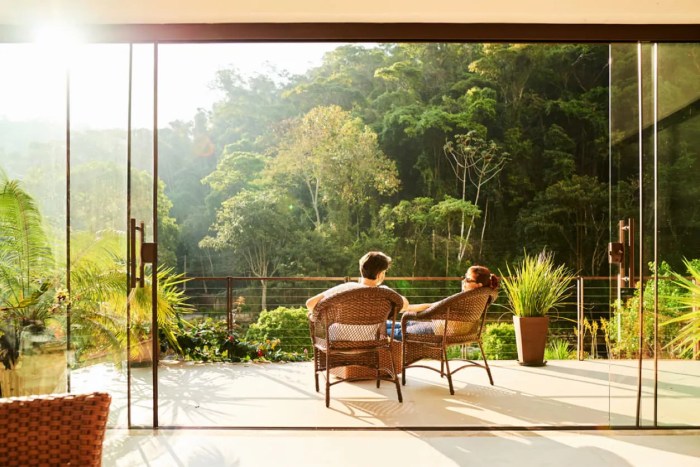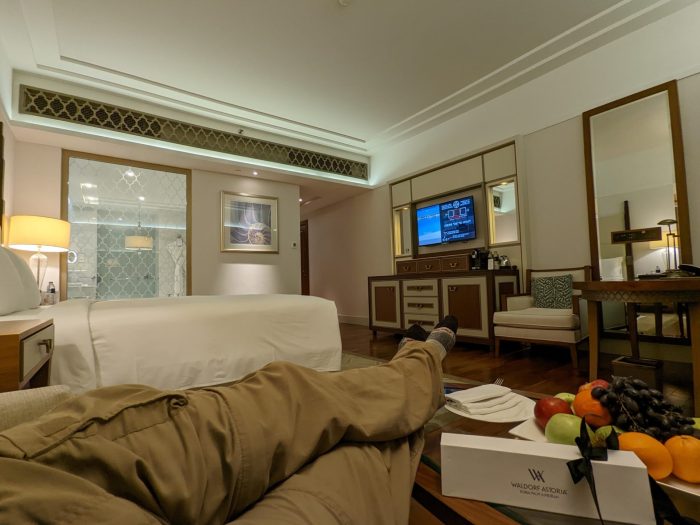Fine Hotels A Luxurious Look

Fine hotels: they’re more than just a place to sleep; they’re experiences. From the moment you step inside, the ambiance, service, and amenities create a world apart. This exploration dives into what defines a “fine hotel,” examining location, service, price, and the unique experiences they offer, covering everything from grand hotels to boutique gems across the globe.
We’ll uncover the secrets behind their high prices, explore innovative services, and discuss the marketing strategies that attract discerning travelers. We’ll also look at the architectural styles, interior design, and sustainability initiatives shaping the future of luxury hospitality. Get ready to discover what truly sets these hotels apart.
Defining “Fine Hotels”

Source: upgradedpoints.com
Fine hotels represent the pinnacle of the hospitality industry, offering an elevated experience that surpasses the standards of typical accommodations. They cater to discerning travelers seeking exceptional comfort, impeccable service, and memorable experiences. This definition encompasses a variety of factors, extending beyond simply a high price tag.
Defining what constitutes a “fine hotel” involves a multifaceted consideration of several key elements. Location plays a crucial role, often situated in desirable urban centers, scenic landscapes, or historically significant areas. Amenities are another key differentiator, ranging from luxurious spas and gourmet restaurants to state-of-the-art fitness centers and personalized concierge services. The level of service is paramount, characterized by attentive staff, personalized attention, and a commitment to exceeding guest expectations. Finally, the price point reflects the overall quality and exclusivity of the experience, although the cost alone doesn’t definitively determine a hotel’s “fineness.”
Categories of Fine Hotels
Fine hotels can be broadly categorized into several distinct types, each offering a unique experience. Understanding these categories helps travelers choose the accommodation best suited to their preferences and travel style.
- Luxury Boutique Hotels: These hotels typically feature a smaller scale and a unique, often locally-inspired design. They emphasize personalized service and intimate ambiance, often located in trendy urban neighborhoods or charming historical districts. Expect high levels of personalized attention and bespoke experiences tailored to individual guest needs. An example might be a small, stylish hotel in the heart of a European city, offering curated local experiences alongside luxurious amenities.
- Grand Hotels: These iconic establishments often boast a rich history and opulent architecture. They are characterized by their grand scale, extensive amenities, and a commitment to upholding a legacy of exceptional service. Think sprawling properties with multiple restaurants, extensive spa facilities, and a sophisticated atmosphere. The Plaza Hotel in New York City serves as a classic example.
- Resorts: Resorts typically offer a comprehensive vacation experience, combining luxurious accommodations with a range of recreational activities and amenities. These can range from beachside escapes to mountain retreats, often featuring multiple dining options, pools, spas, and opportunities for outdoor adventures. The Four Seasons Resort in Bora Bora exemplifies this category, combining overwater bungalows with stunning ocean views and diverse activities.
Geographic Variations in Fine Hotels
The characteristics of fine hotels can vary significantly across different geographic regions, reflecting local culture, architectural styles, and guest expectations.
For instance, fine hotels in Asia may emphasize traditional design elements and personalized service rooted in local customs, while those in Europe might focus on historical significance and sophisticated elegance. In contrast, fine hotels in the Caribbean often prioritize relaxation and access to pristine beaches, while those in North America might showcase modern design and a focus on technological amenities. These variations are not mutually exclusive; many fine hotels blend elements from multiple regions and styles to create a unique and memorable experience. However, understanding these regional differences allows travelers to tailor their expectations and select accommodations that best align with their preferences.
Amenities and Services Offered

Source: squarespace.com
Fine hotels go above and beyond basic accommodations, offering a curated experience designed to pamper and impress their guests. The range of amenities and services varies significantly depending on the hotel’s brand, location, and target market. Understanding these differences helps discerning travelers choose the perfect fit for their needs.
Comparison of Amenities and Services Across Hotel Types
The following table compares the amenities and services typically found in different categories of fine hotels. Note that these are general comparisons, and individual hotels may offer unique combinations or exceed these standards.
| Hotel Type | Standard Amenities | Premium Amenities | Unique Offerings |
|---|---|---|---|
| Luxury Boutique Hotel | High-thread-count linens, complimentary Wi-Fi, 24-hour concierge, daily housekeeping | Personalized butler service, private chauffeured transportation, exclusive spa treatments | Curated art collections, bespoke experiences (e.g., private cooking classes), locally sourced dining options |
| Five-Star Resort | Multiple restaurants and bars, expansive pools and fitness centers, stunning views, multiple room categories | Private villas with pools, golf courses, exclusive beach access, kids’ clubs | World-class spas, curated excursions, themed events (e.g., wine tasting, cooking demonstrations), dedicated event spaces |
| Luxury City Hotel | Elegant rooms and suites, business center, meeting rooms, fine dining options | Rooftop bars with city views, personalized shopping experiences, in-room dining 24/7 | Art installations, partnerships with local cultural institutions, exclusive access to city events |
| Historic Grand Hotel | Ornate architecture and decor, exceptional service, renowned history, high-end dining | Personalized itineraries, historical tours, access to exclusive archives or collections | Afternoon tea service, live music performances, opportunities to learn about the hotel’s legacy |
Technological Advancements and Innovative Services
Leading fine hotels are constantly incorporating technology to enhance the guest experience. This includes features like mobile check-in/check-out, keyless entry using smartphones, personalized in-room entertainment systems with voice control, and smart room controls for lighting, temperature, and curtains. Many hotels also utilize AI-powered chatbots for instant guest service requests, and sophisticated data analytics to anticipate and address guest needs proactively. For example, Mandarin Oriental uses an app that allows guests to pre-order room service, arrange transportation, and make spa appointments, all from their mobile devices. Similarly, the Ritz-Carlton leverages technology to personalize guest experiences by analyzing past stays and preferences.
Exceptional Customer Service Examples
Exceptional customer service in fine hotels goes beyond simply meeting expectations. It involves anticipating needs, exceeding requests, and creating memorable moments. For instance, a hotel might proactively arrange for a guest’s favorite flowers to be delivered to their room, or offer a complimentary upgrade based on their loyalty status. Another example might be a concierge who secures last-minute tickets to a sold-out show, or a staff member who remembers a guest’s dietary restrictions from a previous stay. These small gestures demonstrate genuine care and contribute to a truly luxurious and unforgettable experience. The Peninsula Hotels are known for their personalized service, often going above and beyond to cater to individual guest requests. Their dedication to anticipating needs and proactively addressing them sets a high standard for the industry.
Location and Target Audience

Source: americanexpress.com
The success of a fine hotel hinges not only on its luxurious amenities but also on its strategic location and the specific clientele it aims to attract. A well-chosen location enhances the overall guest experience while understanding the target audience informs design, service offerings, and marketing strategies. This section explores these crucial aspects.
Ideal locations for fine hotels typically boast a combination of factors. Accessibility is paramount, with easy access to major transportation hubs like airports and train stations. Proximity to key attractions, whether cultural landmarks, vibrant shopping districts, or stunning natural scenery, significantly enhances the hotel’s appeal. Scenic views, whether overlooking a cityscape, a tranquil body of water, or a lush landscape, add to the luxury experience and provide memorable photo opportunities for guests. Furthermore, a safe and well-maintained surrounding neighborhood contributes significantly to the overall perception of exclusivity and security.
Ideal Locations for Fine Hotels
Prime locations for fine hotels are characterized by a blend of accessibility and exclusivity. Consider the Peninsula Hotels, known for its locations in bustling city centers, offering easy access to business districts and cultural attractions while still maintaining an air of sophisticated seclusion. In contrast, a resort like the Four Seasons Landaa Giraavaru in the Maldives prioritizes a secluded, idyllic setting, offering unparalleled access to pristine beaches and crystal-clear waters, attracting a different, yet equally discerning, clientele. The specific location must align with the hotel’s brand and target audience.
Target Audiences for Fine Hotels
Fine hotels cater to a diverse range of target audiences, each with unique needs and preferences. These may include affluent leisure travelers seeking luxurious escapes, discerning business travelers prioritizing convenience and efficiency, high-end event planners seeking sophisticated venues, and families looking for high-quality accommodations and services. The design and services offered must reflect these diverse needs. For instance, a hotel catering to business travelers might prioritize high-speed internet, well-equipped business centers, and comfortable workspaces, while a family-focused hotel might offer spacious suites, kids’ clubs, and family-friendly amenities.
Factors Attracting Different Demographics to Fine Hotels
Several factors influence the choice of a fine hotel for different demographics.
- Affluent Leisure Travelers: These guests often prioritize exceptional service, unique experiences (e.g., private butler service, curated excursions), stunning views, and impeccable design. The exclusivity and prestige associated with the hotel brand also play a significant role.
- Discerning Business Travelers: Convenience, efficiency, and seamless connectivity are crucial. High-speed internet, well-equipped business centers, and proximity to business districts are key considerations. A comfortable and stylish workspace within the hotel itself is highly valued.
- High-End Event Planners: They seek sophisticated venues with flexible spaces, state-of-the-art technology, and exceptional catering services. The hotel’s reputation and ability to handle large-scale events are paramount.
- Families: Spacious accommodations, family-friendly amenities (e.g., kids’ clubs, babysitting services), and a safe and secure environment are essential. Proximity to family-friendly attractions further enhances the appeal.
Pricing and Value Proposition
Fine hotels command premium prices, a reflection of the comprehensive experience they offer. This pricing strategy isn’t arbitrary; it’s carefully calculated to balance operational costs, location desirability, and the intangible value of the brand itself. Understanding this interplay is key to appreciating the value proposition of a fine hotel stay.
Fine hotels justify their pricing structures through a combination of factors. High operating costs are a significant element; these include maintaining luxurious facilities, employing highly trained staff, and sourcing high-quality materials and amenities. Prime locations, often in sought-after city centers or scenic areas, contribute significantly to the cost, as do the ongoing expenses of maintaining a prestigious brand reputation. This involves consistent investment in service quality, marketing, and upholding brand standards.
Fine Hotel Pricing Compared to Other Accommodation
The value proposition of a fine hotel significantly differs from other accommodation types like budget hotels, hostels, or vacation rentals. Budget hotels prioritize affordability over luxury, offering basic amenities and often compromising on location and service. Hostels emphasize communal living and cost-effectiveness, prioritizing social interaction over privacy and personalized service. Vacation rentals, while offering more space and sometimes kitchen facilities, often lack the consistent service and amenities of a fine hotel. The value proposition of a fine hotel lies in the holistic experience – a seamless blend of luxury, personalized service, and impeccable attention to detail that transcends the mere provision of a bed and a shower. This justifies the higher price point.
Global Price Ranges for Fine Hotels
The following table illustrates a general price range for different types of fine hotels in various global locations. Note that these are average nightly rates and can vary greatly depending on the season, specific hotel, and room type.
| Location | Hotel Type | Average Nightly Rate (USD) | Included Amenities |
|---|---|---|---|
| New York City, USA | Luxury Boutique Hotel | $800 – $1500 | 24-hour concierge, spa access, fine dining options, complimentary breakfast |
| Paris, France | Historic Grand Hotel | $700 – $1200 | On-site butler service, rooftop pool, Michelin-starred restaurant, personalized room service |
| Tokyo, Japan | Modern City Hotel | $600 – $1000 | High-tech amenities, stunning city views, multiple dining options, fitness center |
| Dubai, UAE | Luxury Resort Hotel | $500 – $1000+ | Private beach access, multiple pools, extensive spa facilities, lavish accommodations |
Marketing and Branding: Fine Hotels
Fine hotels don’t just sell rooms; they sell experiences. Their marketing strategies must reflect this, focusing on crafting a compelling narrative that resonates with discerning travelers seeking luxury and exclusivity. This involves a carefully orchestrated blend of traditional and digital marketing techniques, all geared toward building and maintaining a powerful brand identity.
Marketing strategies for fine hotels hinge on targeted outreach to high-net-worth individuals and affluent travelers. This isn’t about mass marketing; it’s about precision. Think personalized email campaigns, exclusive events and partnerships, collaborations with luxury lifestyle brands, and strategic public relations efforts that generate positive media coverage in relevant publications. Digital marketing plays a vital role, but it’s about quality over quantity—a carefully curated online presence, not a scattergun approach.
Branding and Reputation Management
A strong brand is the cornerstone of success for any fine hotel. It’s more than just a logo; it’s the embodiment of the hotel’s values, its unique selling proposition, and the overall experience it provides. Reputation management is intrinsically linked to branding; positive reviews and word-of-mouth referrals are invaluable, while negative feedback can be incredibly damaging. Proactive reputation management involves actively monitoring online reviews, responding promptly and professionally to both positive and negative comments, and implementing strategies to address any concerns swiftly and effectively. A consistent brand message across all platforms—from the hotel website to social media to in-person interactions—is crucial for building trust and loyalty.
Examples of Successful Branding Campaigns
The Ritz-Carlton’s commitment to impeccable service and personalized experiences has built a brand synonymous with luxury and unparalleled hospitality. Their consistent messaging and dedication to exceeding guest expectations have solidified their position as a leading luxury hotel brand. Similarly, the Four Seasons Hotels and Resorts have successfully cultivated a brand image associated with understated elegance, exceptional amenities, and a commitment to sustainability. Their marketing often highlights the unique character of each property while maintaining a consistent brand identity across their global portfolio. These examples demonstrate the power of long-term brand building, focusing on consistent quality and a clear understanding of the target audience.
Design and Architecture

Source: frequentmiler.com
The design and architecture of a fine hotel are crucial in establishing its luxurious ambiance and overall brand identity. They work in tandem to create an unforgettable guest experience, reflecting the hotel’s history, location, and target market. The architectural styles and interior design choices are carefully considered to evoke specific emotions and create a sense of place.
Architectural styles found in fine hotels are incredibly diverse, reflecting the evolution of design trends and the unique characteristics of their locations.
Architectural Styles in Fine Hotels
Fine hotels often showcase a range of architectural styles, each contributing to the hotel’s unique character and appeal. Classical styles, such as Beaux-Arts and Neoclassical, are frequently employed for their grandeur and timeless elegance. The Plaza Hotel in New York City, a prime example of Beaux-Arts architecture, features elaborate facades, symmetrical designs, and opulent interiors that reflect the style’s emphasis on symmetry, grandeur, and classical motifs. Conversely, modern and contemporary hotels might incorporate minimalist designs, using clean lines and natural materials to create a sophisticated and uncluttered aesthetic. The Burj Al Arab in Dubai, with its sail-like structure, exemplifies a bold, modern approach, showcasing innovative architectural techniques and a striking visual impact. Historic hotels might blend various styles, reflecting renovations and additions over time, creating a unique architectural narrative.
Interior Design Elements Contributing to Luxury
Interior design plays a pivotal role in creating the luxurious atmosphere of fine hotels. High-quality materials such as marble, fine wood, and bespoke textiles are frequently used. Careful attention is paid to details such as lighting, which can significantly impact the mood and ambiance of a space. Subtle yet effective lighting schemes, incorporating natural light where possible and strategically placed accent lighting, contribute to a feeling of warmth and sophistication. The use of art and antiques can add a layer of cultural richness and sophistication. Custom-designed furniture, carefully chosen artwork, and unique decorative elements all contribute to a personalized and luxurious experience. Color palettes are often carefully curated to evoke specific emotions; calming neutrals might be used in guest rooms, while bolder colors might be incorporated in public spaces to stimulate interaction.
The Grand Azure Hotel: A Fictional Example
The Grand Azure Hotel, nestled on a cliff overlooking the Mediterranean Sea, is a testament to modern luxury with classical influences. Its architecture is a blend of contemporary sleekness and Mediterranean Revival style. The exterior features clean lines and expansive glass windows, maximizing the stunning ocean views. Terracotta roofing and arched doorways nod to the region’s architectural heritage, creating a harmonious blend of old and new. Inside, the hotel’s interior is a masterpiece of sophisticated design. The lobby is a spacious, double-height atrium, flooded with natural light. Marble floors, plush seating areas upholstered in luxurious velvet, and carefully chosen artwork create an atmosphere of relaxed elegance. Guest rooms are spacious and feature private balconies with breathtaking views. Neutral color palettes, accented with rich blues and golds, evoke a sense of calm and tranquility. The hotel’s amenities include an infinity pool overlooking the sea, a world-class spa, and several fine-dining restaurants, each with its unique design and ambiance, reflecting the overall luxurious and sophisticated feel of the hotel. The Grand Azure Hotel seamlessly blends its stunning location, architectural style, and interior design to create an unforgettable luxury experience.
Sustainability and Social Responsibility
The modern traveler is increasingly conscious of environmental and social impact, demanding more from the hotels they choose. Fine hotels are responding by prioritizing sustainability and social responsibility, recognizing it’s not just a trend, but a crucial aspect of long-term success and brand reputation. This commitment translates into tangible benefits, attracting environmentally and socially conscious guests while simultaneously reducing operational costs and enhancing brand image.
Fine hotels are integrating eco-friendly practices across their operations in several significant ways. This goes beyond simple green initiatives and delves into a comprehensive approach to minimize their environmental footprint and contribute positively to the communities they serve.
Eco-Friendly Operational Practices
Many fine hotels are actively reducing their carbon footprint through energy-efficient designs and technologies. This includes implementing smart building management systems to optimize energy consumption, investing in renewable energy sources like solar panels, and utilizing energy-efficient appliances and lighting. For example, the Mandarin Oriental, Bangkok, boasts a comprehensive sustainability program including solar panels and water conservation initiatives, significantly reducing its energy and water usage. Beyond energy, water conservation is a key focus, with initiatives such as low-flow fixtures, rainwater harvesting systems, and efficient irrigation techniques. Waste reduction is another critical area, with many hotels implementing robust recycling programs, composting initiatives, and reducing single-use plastics. The Peninsula Hotels group, for instance, has a strong focus on minimizing waste through comprehensive recycling programs and sourcing sustainable products.
Social Responsibility Initiatives
Social responsibility extends beyond environmental concerns to encompass ethical labor practices, community engagement, and charitable contributions. Fine hotels are increasingly committed to fair wages and safe working conditions for their employees, often exceeding minimum requirements and providing comprehensive benefits packages. Furthermore, many engage in community outreach programs, supporting local charities, sponsoring community events, and partnering with local businesses. The Four Seasons Hotels and Resorts, for example, are known for their extensive community involvement programs globally, supporting various local causes and initiatives. This commitment to social responsibility enhances the hotel’s reputation, attracting guests who value ethical business practices and fostering a stronger connection with the local community. It strengthens brand loyalty and attracts employees who are aligned with the hotel’s values. The positive publicity generated from these initiatives further enhances the hotel’s brand image and market appeal.
Concluding Remarks
Ultimately, the allure of fine hotels lies in their ability to create unforgettable memories. They are investments in experiences, offering more than just a bed for the night. Whether it’s the impeccable service, stunning location, or unique amenities, these hotels cater to a desire for the exceptional, setting a benchmark for luxury and exceeding expectations. From the grandest palaces to the coziest boutique escapes, the world of fine hotels continues to evolve, always striving for excellence and innovation.
General Inquiries
What’s the difference between a luxury hotel and a fine hotel?
While often used interchangeably, “fine hotel” suggests a higher level of personalized service and unique experiences beyond the standard luxury amenities. Luxury hotels offer high-end amenities, but “fine hotels” often emphasize bespoke services and a curated experience.
How can I find the best fine hotel for my needs?
Consider your budget, desired location, preferred amenities (spa, golf course, etc.), and the type of experience you seek (romantic getaway, family vacation, business trip). Online travel agencies and hotel review sites can help narrow down options based on your criteria.
Do fine hotels offer packages or discounts?
Many fine hotels offer seasonal packages, loyalty programs, and corporate rates. Checking their websites directly or contacting them is recommended to find available deals.
Are fine hotels accessible to people with disabilities?
Accessibility varies by hotel. Check individual hotel websites or contact them directly to inquire about specific accessibility features and services they provide.
What about pet-friendly fine hotels?
Pet policies vary widely. Always check the hotel’s policy before booking if you plan to bring a pet; many high-end hotels do allow pets, but often with additional fees.
Comments are closed.